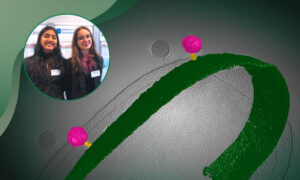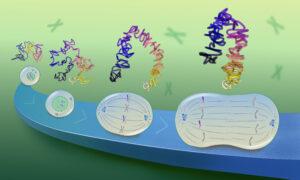
To laugh, and then think
Meet Ig Nobel emcee Marc Abrahams, who will give an EMBL Science and Society talk in December

The Ig Nobel Prizes are renowned as a spoof alternative to the Nobel Prizes. The annual Ig Nobel awards ceremony is a celebration of curious, imaginative studies that make people laugh. Yet while studies of cats behaving like liquids or frogs levitating inside of a magnet might have you chortling, its founder Marc Abrahams has an equally important purpose in mind for the Prizes: to get you to think. Abrahams is also editor of the Annals of Improbable Research and will give an EMBL Forum on Science and Society talk at EMBL in Heidelberg on 4 December. We caught up with him to find out more.
What does it mean to call research improbable?
Improbable, like many words, can have different meanings. The meaning that I choose to concentrate on is: not what you expect. The studies that win Ig Nobel prizes all have this element in common. In 2015, for instance, the Ig Nobel Prize for Mathematics was awarded for a study that tried to apply mathematical techniques to determine whether and how Moulay Ismael, an emperor of Morocco (who now has the nickname ‘the bloodthirsty’), fathered 888 children over a 32-year time period. In the end they not only found it was possible, but they also found some unexpected things: according to their computer simulations, Ismael could have fathered 600 sons, and the harem size needed to achieve that number ended up being far smaller than what the historical reports asserted!
Do you have a favourite improbable study?
This is a very hard question and one that I get a lot! If I had, say, six studies to choose from, it might be easy. But since 1991, we have awarded hundreds of different Ig Nobel prizes and to pick out my favourites is just too difficult!
Editor’s note: Here are a few of our favourites
- How long it takes mammals to empty their bladders
- Why pigeons are not attracted to a particular statue in Kanazawa
- How beer froth obeys the mathematical law of exponential decay
- Why a shower curtain tends to billow towards you when you take a shower
Is there a difference between “silly” and “serious” science?
Those are words that get twisted up very easily. Once something becomes generally understood and accepted, then it comes to being seen as serious and important. Almost everybody either forgets or doesn’t become aware that this thing started out as something that everyone else regarded as nuts! Any scientific discovery seems like such an easy thing after it has been discovered, and it almost never was. Your understanding of a study might change – drastically! – if you spend time looking at its details.
We do something in the Ig Nobel ceremony called the 24/7 Lectures, in which we bring in scientists that explain their research in twenty-four seconds of intense jargon followed by seven clear words. We choose studies, for Ig Nobel prizes, that have that quality: that it’s not possible if you just see a seven-word summary to know whether it is real or fake. You’ve got to spend another couple of seconds – and preferably more than that! – actively looking at something you come across, say in the news or in a research study.
Can we ever find a way to make even the most serious of people laugh?
Yes, we can! Because scientists spend a lot of their time thinking about things not very many other people are thinking about, they often pick up stereotypes that show them to be of a certain way – but then you realise that’s not really who they are. I like to think most people have a sense of humour!
Ig Nobels have two criteria: to make people laugh, and then make them think. Is it important they be in that order?
When a study wins an Ig Nobel prize, there’s something about it so surprising that about the only initial reaction you can have is to laugh. This makes you stop and pay attention to the study. At this point you may start to realise, “Wow, I’m going to keep thinking about this thing because I want to know more about this,” or you don’t. The other direction – to think and then laugh – is slower and more contemplative. When you’ve got that gut feeling to laugh at something, you can train yourself to – even for an instant –think about it, and not move on to something else right away. If you can do that, I think that’s a valuable skill you’ve given yourself, in science and beyond.
 Curiosity is a profoundly human trait. We start asking questions almost as soon as we learn to speak and continuously redefine our understanding of the world by questioning it. This is the driving force behind science, technology, engineering and maths. As part of our curiosity editorial theme, we are exploring what EMBL is curious about.
Curiosity is a profoundly human trait. We start asking questions almost as soon as we learn to speak and continuously redefine our understanding of the world by questioning it. This is the driving force behind science, technology, engineering and maths. As part of our curiosity editorial theme, we are exploring what EMBL is curious about.
Read more articles about curiosity and where it can take you.


